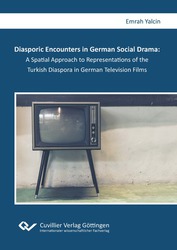| Departments | |
|---|---|
| Book Series (96) |
1381
|
| Nachhaltigkeit |
3
|
| Gesundheitswesen |
1
|
| Humanities |
2370
|
| Medienwissenschaften | 16 |
| Theology | 57 |
| Philosophy | 102 |
| Law | 424 |
| Economics | 851 |
| Social sciences | 418 |
| Sports science | 48 |
| Psychology | 233 |
| Educational science | 190 |
| History | 183 |
| Art | 111 |
| Cultural studies | 166 |
| Literary studies | 117 |
| Linguistics | 88 |
| Natural Sciences |
5408
|
| Engineering |
1795
|
| Common |
98
|
|
Leitlinien Unfallchirurgie
5. Auflage bestellen |
|
Advanced Search
Diasporic Encounters in German Social Drama: A Spatial Approach to Representations of the Turkish Diaspora in German Television Films (English shop)
Emrah Yalcin (Author)Preview
Extract, PDF (170 KB)
Table of Contents, PDF (100 KB)
Contemporary television fictions allow the audience to experience the reality of everyday life in audio-visual spaces. Thus, controversial issues discussed in German society such as homosexuality, racism or ‘clashes of cultures’ are revisited in the social drama films produced for German television through a mixture of generic conventions such as tragedy, thriller and melodrama. Consequently, the audio-visual representations of the people, who are the focus of these discussions, represent an interesting area of research. The book deals with the audio-visual spatiality of the Turkish diaspora in Berlin in three contemporary TV films in this format; namely Wut (Range, dir. Zuli Aladağ, 2006), Die Neue (The Newcomer, dir. Buket Alakuş, 2015) and Nachspielzeit (Extra-Time, dir. Andreas Pieper, 2015). Therewith, it brings a spatial approach to the issue of ‘polemical belonging of the Turkish Diaspora to the German national space’ within the audio-visual context. The proposed spatial approach presents an alternative argument to the assumptions of German politicians, who celebrate ‘a common German history that bases on Christian-Jewish identity, democracy and enlightenment’.
| ISBN-13 (Hard Copy) | 9783736973732 |
| ISBN-13 (eBook) | 9783736963733 |
| Final Book Format | A5 |
| Language | English |
| Page Number | 218 |
| Lamination of Cover | glossy |
| Edition | 1 |
| Publication Place | Göttingen |
| Place of Dissertation | Bayreuth |
| Publication Date | 2021-03-23 |
| General Categorization | Dissertation |
| Departments |
Medienwissenschaften
Cultural studies |
| Keywords | Television fiction, Fernsehrfiktion, audio-visual space, audiovisueller Raum, German Television, deutscher Fernseher, television reality, Fernsehwirklichkeit, media studies, Medienwissenschaft, film and television studies, Film- und Fernsehrwissenschaft, social drama, Gesellschaftsdrama, cultural geography, Kulturgeographie, Turkish Diaspora, türkische Diaspora, television Film, Fernsehfilm, audio-visual representation, audiovisuelle Repräsentation, spatiality, Räumlichkeit, third space, dritter Raum, televisual Spaces, televisuelle Räume, social encounters, soziale Begegnungen, Goffman, social spaces, soziale Räume, H. Lefebvre, E. Soja, power relations, Machtbeziehungen, national identity, nationale Identität, integration, Integration, migration, Migration, hybridity, Hybridität, diasporic experiences, diasporische Erfahrungen, H. Bhabha, A. Brah, diaspora, Diaspora, identity, Identität, home, Heimat, religion, Religion, ethnicity, Ethnizität, identity construction, Identitätskonstruktion, otherness, Anderssein, orientalism, Orientalismus, Islam, German-Turkish cinema, deutsch-türkisches Kino, encounter scenes, Begegnungszene, cultural otherness, kulturelles Anderssein, racism, Rassismus, Gastarbeiter, guest worker, Einwanderer, immigrants, Mehrheitsgesellschaft, mainstream society, Ghettoisierung, ghettoisation |
| URL to External Homepage | https://medienwissenschaft.uni-bayreuth.de/ |








